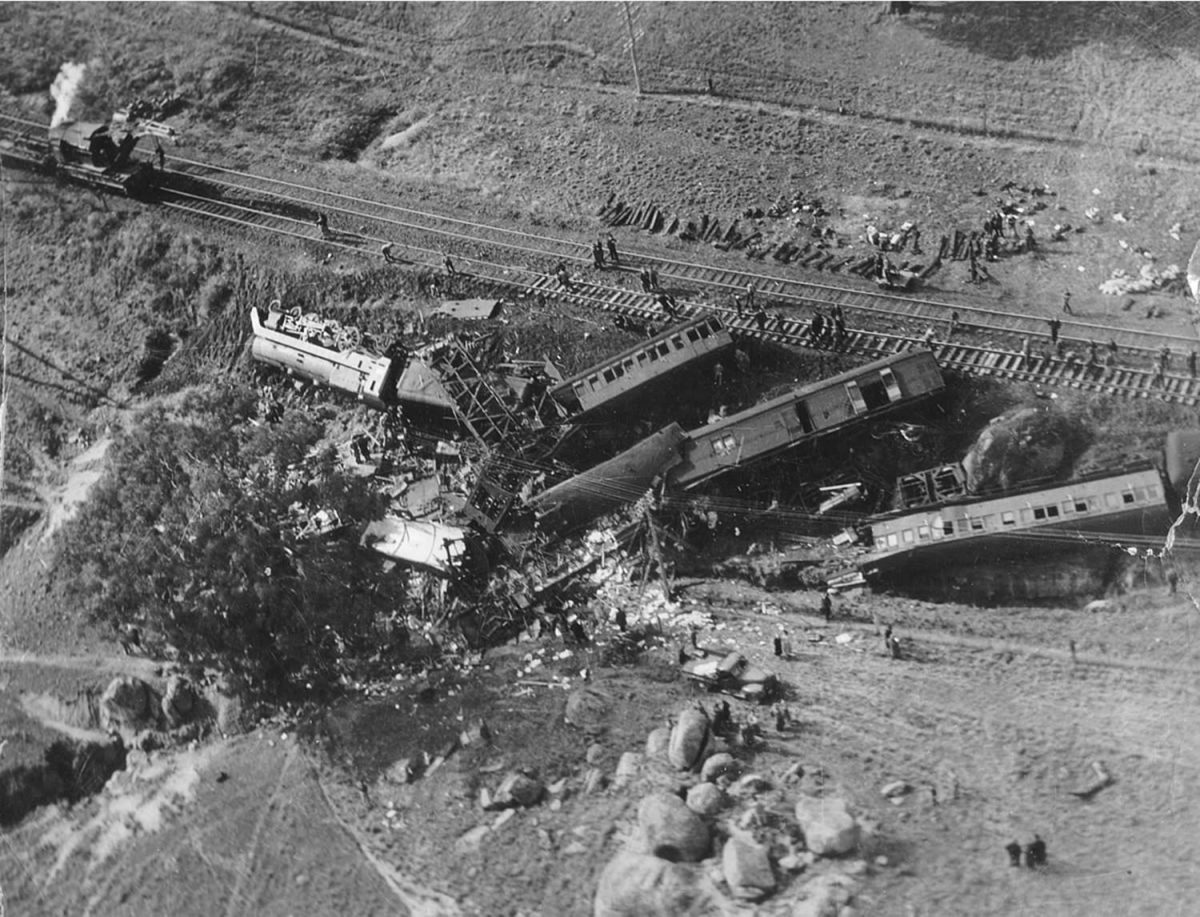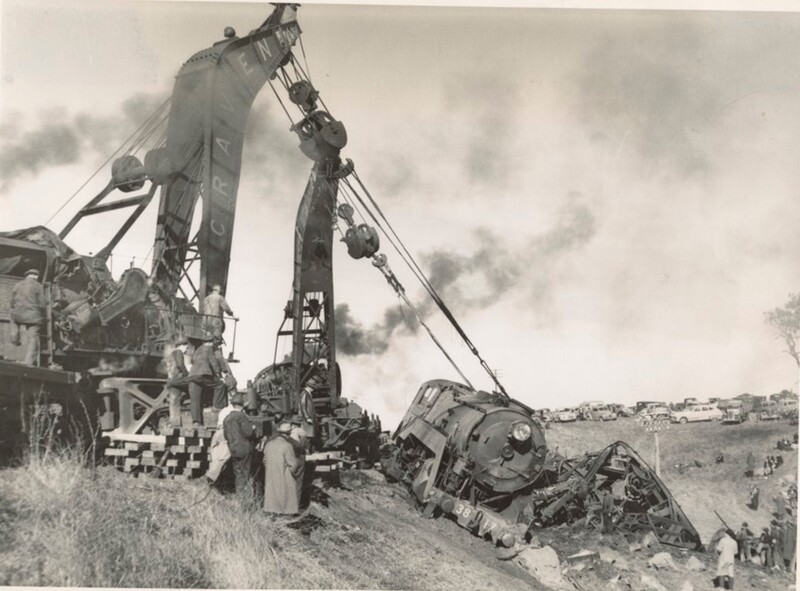
The scene of the 1948 Rocky Ponds derailment, which left four people dead. Photo: Museums of History.
At Rocky Ponds, between Harden and Binalong in southern NSW, at least four trains have derailed over the past 127 years.
The first, in 1898, was written off as bad luck. The second, in 1926, caused commuter chaos. The third, in 1948, was a deadly shock that claimed four lives. And the fourth, in 2002, triggered a modern investigation and fresh concerns.
There is no marker at the site on the Main Southern Line. But gouge marks in the stone near the sweeping bend serve as a quiet reminder of how things can go wrong on an ordinary stretch of track.
The most devastating incident occurred on 30 June, 1948.
In the early hours, the South-West Mail was on its overnight run through the South West Slopes, hauled by the powerful C38-class locomotive 3817. It had departed Sydney at 10 pm, carrying 123 passengers: 26 in sleepers, 31 in first class and 66 in second class.
Around 5 am, as the train neared Rocky Ponds, disaster struck.
The engine and seven of its nine carriages left the tracks, plummeting six metres down an embankment.
Survivors recalled a sudden jolt, the scream of grinding metal, then an eerie silence broken by cries for help.
Driver Ernest Nolan of Goulburn told reporters: “We were going along nicely then in a flash all hell was let loose … it was pitch black. The first I knew was when my mate Norman Jeffrey dug me out from under the coal.”
A bruised passenger waded up a creek to raise the alarm at a house more than 1.5 kilometres away.
Farmers, clutching lanterns and blankets, were first on the scene. Emergency crews from Harden, Cootamundra and Yass soon followed.
“I don’t know how anyone got out of that first carriage,” said Harden police sergeant J Botterell. “A woman with a six-month-old baby was flung onto the rock at the bottom of the slope. Neither of them suffered a scratch.”
More than an hour after the accident, a two-year-old girl was found alive in the wreckage.
Four people in the timber-bodied first-class carriage behind the engine were killed: Jane Matilda Burnes, 64, of Wagga Wagga; Arthur Albert Churchin, 60, of Temora; Keith Shuttleworth, 24, of Mangoplah; and Stanley Benjamin Welsh, 25, of Barmedman.
Nineteen others were treated at Harden Hospital, with one flown to Sydney.
A temporary command post was established trackside, rail cranes were brought in to clear the line and in the days that followed, locals took picnic lunches out to support the recovery efforts.
The Mail was a trusted service, and the derailment stunned the region, especially as the train was travelling well below the speed limit.
Speculation was rife – rotten sleepers, sabotage – but attention quickly turned to a fractured section of rail found at the site. Metallurgical analysis showed it had failed under stress, possibly due to fatigue or thermal contraction. A coroner ruled the deaths accidental.
The 1948 accident ended a 22-year fatality-free streak for NSW Railways.
It was considered the state’s worst rail disaster since 1926, when 27 people were killed on the North-west Mail at Murulla, near Murrurundi.
Poor old Locomotive 3817, in service less than a year, had rolled about 120 degrees but suffered only minor damage. It was returned to duty but gained a reputation as a “hoodoo engine” after being involved in three more accidents before its retirement in 1963.

Cranes were used to clear the accident site in the days following the 1948 derailment. Photo: The Maher Cup website.
Rocky Ponds, too, was gaining a reputation.
In March 1950, The Farmer and Settler reported on yet another derailment – this time involving 12 trucks from a goods train.
The article cited longstanding concerns about the strength of the Main Southern Line and noted that much-needed track upgrades had been delayed during the war, with postwar shortages pushing them back even further.
Concerns stretched back decades.
On 13 June, 1898, The Daily Telegraph reported a “marvellous escape” for passengers when the “paper train” derailed at the same bend.
The passenger carriage swung at right angles over a steep embankment but didn’t fall.
Damage was estimated at £400 and the cause was found to be a cracked axle on a goods wagon.
A man was later jailed for two months for stealing from the wreck.
Another derailment, in March 1926, added to the location’s ominous history.
A goods train leaving Galong shortly after midnight became uncoupled near Rocky Ponds.
Fourteen runaway trucks derailed near the station – some reduced to matchwood. The brake van somersaulted down the embankment and both lines were blocked. Fortunately, no one was injured.
Then, in 2002 – 54 years after the South-West Mail crash – a Pacific National freight train derailed at the same spot.
The Office of Transport Safety Investigations (OTSI) found the cause to be a lateral misalignment of the track – a geometry defect that had developed over time.
While general maintenance was up to standard, early signs of the misalignment were missed.
The report recommended better monitoring, especially in known trouble areas.
It also noted that Rocky Ponds, being remote, curved and lightly trafficked, had long posed a challenge for track stability.
The line is still in use today, but Rocky Ponds station closed to passenger services in 1975 and was later demolished. No trace of it remains.
Yet the bend endures – and so does its history.








